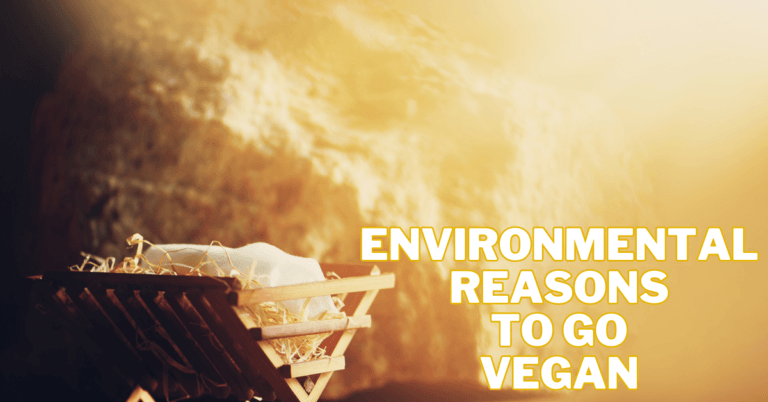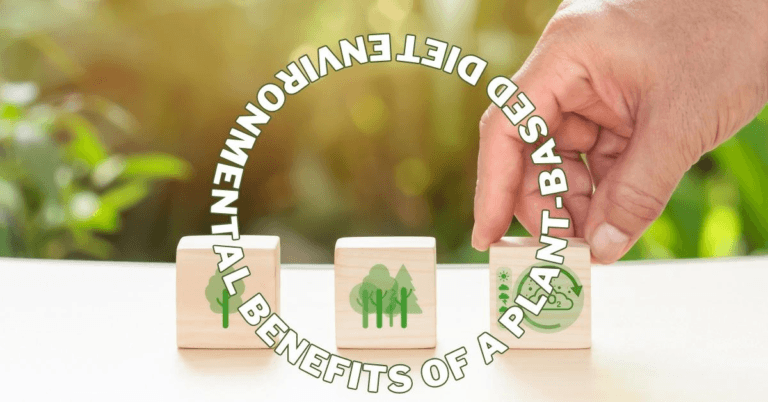Environmental Benefits Of Veganism

Environmental Benefits Of Veganism
In 2018, the United Nations identified animal agriculture and meat production as the most urgent problem around the world – a catastrophe of our own making.
Going a step further, the United Nations Environment Programme recognized vegan companies like Beyond Meat and Impossible Foods as “Champions of the Earth”, more environmentally-friendly options that could be able to fully substitute the demand for meat in the future.
Stopping Livestock Emissions
Between carbon dioxide, methane, and nitrous oxide, one thing is clear: the animal agriculture industry needs to own up to the number of greenhouse gasses livestock releases into our atmosphere.
Livestock emissions account for over 14% of all anthropogenic GHG emissions, with 44% coming from methane alone.
If everyone on the planet would go vegan, livestock emissions would stop entirely, single-handedly putting an end to one of the biggest contributors to climate change.
Using Fewer Resources
Animal products are significantly more resource-intensive than plant-based foods, with beef requiring the most water consumption and land use for its production.
A vegan diet uses fewer resources, as growing plant foods requires five times less water than producing animal-based foods, and a global shift to a vegan diet would reduce land use by a whopping 75%.
In comparison, studies show that meat, fish, eggs, and dairy use 83% of the world’s farmland and contribute 56 to 58% of food’s emissions, while providing 18% of our calories!
Veganism And The Environment
Veganism has a clear impact on animal welfare by reducing the demand for animal farming and many of its cruel artificial practices. A reduction in animal farming also creates massive environmental benefits. A recent study by Oxford University suggests that eating a vegan diet could be the “single biggest way” to reduce environmental pollution on earth.
Furthermore, this same research suggests that cutting meat and dairy products from a person’s diet could reduce an individual's carbon footprint from food by up to 73%. If everyone switched to this diet, global farmland use could be reduced by 75%, an area equivalent to the size of the US, China, Australia and the EU combined. This would free up land, cutting greenhouse gases and enabling the wildlife to flourish.
What Is Veganism?
Veganism can be defined as a practice that abstains from all forms of animal cruelty. The term was coined in 1944, and the concept can be traced back to ancient Indian and eastern Mediterranean communities. The health, ethical and environmental benefits of veganism are beyond satisfactory. Individuals who choose to follow this path are associated with lower risks of various bodily problems.
Known as a new way of celebrating life, it has helped several societies create a protected belief system. Along with that, a vegan diet can be raised with 8 times fewer energy costs than most meat and dairy-based items. On the other hand, it becomes challenging to track your calories resulting in lower energy, weight loss, and hormonal imbalance. Also, following veganism may cause one to develop Orthorexia, an eating disorder where people have an unhealthy obsession with strict nutritious patterns and implying over-restrictions.
In countries like the U.S, U.K, and China, it is strongly believed that eating non-vegan items is essential to continue our world's food chain while providing your body with the best nutrients available. The truth lies in the fact that if you face a moral dilemma of choosing between the taste of meat/dairy-based products and the lives of animals killed for the same, only your conscience can decide for you.
There is so much innovation in the plant-based industry which has created a massive demand in the market. Big brands are spreading awareness about issues revolving around animal agriculture and its disadvantages, pushing more communities to consider this alternative way of living. Becoming a lifestyle choice, it is gaining enormous popularity amongst the youth, thus leading to a positive approach to overall livelihood.
How Does Veganism Help The Environment?
To understand why Veganism is good for the environment, we have to look at how meat, fish, and dairy production seriously impact our planet’s resources and ecosystem. From greenhouse gas emissions to deforestation, species extinction and water pollution, the animal agriculture industry is the main driver behind our planet’s environmental crisis.
The environmental impact of modern animal agriculture has been explored in popular documentaries like Cowspiracy, Before The Flood, and Earthlings. However, it’s a science that offers the biggest contribution to the “vegan for the planet” argument. Here we list 15 ways Veganism helps the environment, backed up by bombshell scientific and environmental studies that will open your mind to what Veganism is really able to achieve!
1. Water Conservation
From taking brisk showers to giving up almonds, it seems like the world has united in the search for the most effective way to save water in the face of increasing droughts. However, adopting a vegan diet is the most efficient way of saving water, as plant foods require way less water to produce than animal products. In fact, agricultural production as a whole accounts for 93% of the world’s water supply, with meat and dairy products being the biggest culprit: one-quarter of our freshwater is used for this industry alone! On the other hand, research shows that one person going vegan can save over 200,000 gallons of water a year.

2. It Cleans The Soil
Similar to how livestock pollutes water, they also erode and weaken soil. This is partly because raising livestock usually leads to deforestation, which clears huge swaths of land of the different elements (such as trees) that provide nutrients and resilience to make room for the livestock to roam.
The world loses roughly the size of Panama each year to deforestation, which also accelerates climate change (trees store carbon)
Raising a diversity of plants, instead, nourishes the soil and leads to long-term resilience.

3. Cutting Greenhouse Gas Emissions
Greenhouse gasses (often shortened as GHG) emits radiant energy into the atmosphere, contributing to global warming and climate change.
The high levels of carbon dioxide, methane, and other GHG produced by animal agriculture generate over 14% of global emissions, greater than all transportation emissions.
Studies show that adopting a vegan diet can cut agricultural greenhouse gases in half.
4. Mitigating Climate Change
With greenhouse gases being the leading cause of climate change due to the “greenhouse effect,” we should expect Veganism to help mitigate climate change.
Studies have found that if everyone went vegan, emissions contributing to global warming would be cut by 70%, enough to stop and reverse the harmful effects of climate change, including rising sea levels, floods, melting glaciers, and droughts.

5. Preventing Species Extinction
Animal agriculture impacts the world’s biodiversity by using wildland for soy and maize crops, the primary livestock feed.
The increasing use of land has led to several native species being threatened globally, including different species of monkeys, elephants, bears, tigers, alligators, lions, wolves, and parrots.
Choosing a vegan diet will go a long way in preventing species extinction by eliminating the need for livestock and factory farms to feed crops. Veganism provides a more sustainable agricultural model, focused on feeding people, not animals for slaughter.
6. Combating World Hunger
Livestock feed production also impacts food availability in the areas of the world where many people need food. Animal agriculture monopolizes the world’s resources, including water and land, to fuel its production: it is estimated that 36% of the calories produced by the world's crops are being used for animal feed. In comparison, only 12% of those feed calories end up contributing to the human diet.
Veganism combats world hunger by cutting the “middle man” (in this case, the middle animal), as it would be more practical and calorie-efficient to use our planet’s resources for crops that feed humans directly.
The aforementioned research shows that growing food exclusively for direct human consumption would increase available food calories up to 70%, feeding 4 billion people worldwide!

7. Reducing Energy Consumption
Livestock requires enormous fossil energy consumption for multiple activities such as feed production, breeding, production and spread of fertilizers, electricity use, and farm operating costs.
On the other hand, plant products have much higher energy efficiency, as it’s estimated that animal-based protein requires eight times more fossil-fuel energy than creating plant-based protein.
A vegan diet saves energy as well as lives!
8. Reducing Air Pollution
We already discussed how animal agriculture is one of the main contributors to GHG emissions, with carbon dioxide (CO2) being one of the most harmful ones for the environment. The meat and animal products industry accounts for at least 32,000 million tons of carbon dioxide per year.
Adopting a vegan diet decreases air pollution by saving carbon dioxide emissions. According to the Veganism Impact Report, the world would see a 70% decrease in CO2 food-related emissions if the current meat-eating population were vegan.

9. Preserving Habitats
The meat and dairy industry is also responsible for destroying the native habitats of wild species, with livestock management and feedstock being the single biggest driver of habitat loss in tropical countries.
It is estimated that by 2050, Asian and African countries would need a 30-50% increase in the land to support growing meat production, permanently destroying the habitats of native species populating the area.
However, if most of the world were to follow a vegan diet, the decreased demand for meat products would preserve these precious habitats and the species living in them.

10. Preserving Species
The wildlife population is also lost to animal agriculture.
For example, in the United States, 3 million wild animals, including threatened and endangered species like wolves, bobcats, and mountain lions, are killed each year by the USDA’s Wildlife Services.
This is an attempt to protect livestock from natural predators. Still, countless non-target species are also caught in the middle of this artificial struggle, including different protected bird species.
11. Agricultural Air Pollution
Animal agriculture might be the last thing you think about when imagining air-polluting industries. Perhaps that’s because air emissions from raising animals are less visible than a factory smokestack, for example. Still, their impact has severe implications for both human health and the environment. That stinks. And I’m not just talking about the smell, although farm odours can create a myriad of human health problems too.
The most obvious of contaminants, farm odours, comes from a mix of over 200 different chemicals. Not only objectionable to smell, but these odours can also cause health problems for people who live near large farming operations. One group of residents reported significantly more tension, depression, less vigour, more fatigue, more confusion, and even an increase in anger.
Beyond the odour, other agricultural air quality issues come in Particulate Matter (PM) and Greenhouse Gases.

12. Stabilizing The Ocean
Overfishing has led to disastrous imbalances for the ocean’s biodiversity.
Besides massively reducing the fish population worldwide, overfishing has changed the characteristics of the remaining fish, causing a dangerous domino effect that puts the complex ocean food chain at risk.
The fish population needs to be balanced to affect the ocean’s ecosystem the way nature intended, and Veganism stabilizes the ocean by reducing the world’s increasing demand for fish.
13. Cleaning Waterways
Livestock feeding pollutes the surrounding waterways with high doses of chemicals, including antibiotics, leading to the appearance of “dead zones.”
Although industrial and municipal waste is also major factors contributing to water pollution, animal agriculture is sadly taking the lead as demand for animal products grows. Going vegan won’t eliminate the problem, as fertilizers remain a big factor in nutrient pollution. Still, they will eliminate the great amount of animal waste, hormones, and antibiotics currently polluting our waterways.

14. Protecting The Rainforest And Lands
Animal agriculture is responsible for 91% of the destruction of the Amazon rainforest, and it is the greatest driver of deforestation and land use worldwide.
On the other hand, research has found that following a vegan diet can cut land use by 76%, protecting the Amazon, its native tribes, and countless tropical species.
15. Replenishing The Sea
Overfishing has not only thrown the marine ecosystem out of balance, but it has also managed to cut the total fish population by half compared to 1970 – that was only 50 years ago.
The demand for tuna and mackerel, in particular, has become unsustainable, and the two species are currently at the brink of extinction. Going vegan allows marine life to thrive again, repopulating our oceans and replenishing our seas.

16. Removing Nitrous Oxide
When animal waste is broken down, it produces nitrous oxide, which is 300 times more potent than CO2 in its warming effect. It is estimated that 6 million tons of nitrous oxide are produced by livestock each year, accounting for 65% of all nitrous oxide emissions.
Veganism reduces nitrous oxide emissions by eliminating the demand for livestock, going a long way to restore our planet’s climate balance.
17. Stopping Livestock Emissions
Between carbon dioxide, methane, and nitrous oxide, one thing is clear: the animal agriculture industry needs to own up to the number of greenhouse gasses livestock releases into our atmosphere. Livestock emissions account for over 14% of all anthropogenic GHG emissions, with 44% from methane alone. If everyone on the planet went vegan, livestock emissions would stop entirely, single-handedly putting an end to one of the biggest contributors to climate change.
18. Using Fewer Resources
Animal product is significantly more resource-intensive than plant-based foods, with beef requiring the most water consumption and land use for its production.
A vegan diet uses fewer resources, as growing plant foods requires five times less water than producing animal-based foods, and a global shift to a vegan diet would reduce land use by a whopping 75%.
In comparison, studies show that meat, fish, eggs, and dairy use 83% of the world’s farmland and contribute 56 to 58% of food’s emissions while providing 18% of our calories!
19. Enhances Human Health
It’s no secret that humans have countless health issues to contend with over the course of a lifetime, and it’s on everyone’s mind. We worry about cancer, heart disease, diabetes, stroke and other complications. Many people maintain diets high in processed meat and added preservatives, sugar, and chemicals that impede health and energy in today's food market. While it’s far from a given that changing to veganism will automatically mean a healthier diet, the change often improves food quality.
Many people worry they won’t maintain a sustainable and healthy diet if they shift into this new eating regimen, but veganism done right provides all the nutrients we need and keeps us healthy. Fresh fruits, vegetables, lentils and other vegan staples are crucial in our diets. Cutting meat and other animal products will help people remember to consume the critical foods they otherwise often forget.
It’s also worth mentioning that adopting veganism can be a fun process that helps the environment and exposes you to new, delicious foods you would never have considered eating before. New and exciting menus and cooking options can make you a better chef.
20. Allows Ethical Treatment Of All Living Creatures
Humans aren’t the only living beings on the planet who deserve to be treated with respect. Animals deserve proper treatment, too. They’re gentle, feeling and more intelligent than most people give them credit for — they know what’s happening to them.
Most people can agree that it’s not right for any creature to suffer from the time they’re born to the time they die — animals born into factory farms are no different. The vast majority of meat produced comes from a grim reality you can combat by cutting even a few meat products from your diet each week. You’ll be improving the environment knowing that your eating habits are more ethical and kind for every individual — human and nonhuman — sharing this planet.
A Vegan Diet Will Make You More Healthy
A vegan diet provides all the nutrients you need- and probably don’t get enough of. Fresh vegetables, fruits and other vegan staples are teeming with nutrients that meat doesn’t provide.
You can get all the protein you need from peanut butter, quinoa, lentils, beans, and much, much more.
The World Health Organization just released a report further outlining the increased risks of colorectal cancer from regular red meat and processed meat consumption. This is on top of existing concerns about heart disease, stroke, and other health complications.
Many people have diets extraordinarily high in processed food containing added sugar, preservatives, chemicals, and other ingredients that can impede your health, make you feel sluggish daily, and lead to long-term health problems. A lot of the time, meat is at the center of this diet.
Of course, vegans can have a highly processed, unhealthy diet. But going vegan forces you to actively consider the ingredients of the foods you are consuming. This daily consideration will most likely, over time, lead to a fresher, more nutrient-rich diet. It’s really amazing how much better you feel when you eat healthily. Try it if you don’t believe me.
Conclusion
Overall, producing plant-based foods requires much less energy and resources than producing animal products. Becoming vegan is just one change in our lifestyle that can help reduce humans' impact on global warming.
Even if you’re not excited about eliminating meat from your diet, reducing your intake to one or two fewer meaty meals every week can make the biggest difference! It’s estimated that a plant-based diet produces 7 times more GHG emissions than a plant-based diet, so having Meatless Mondays can help the planet!
I trust you enjoyed reading the article about the Environmental Benefits Of Veganism. Please stay tuned. There are more blog posts to come very shortly.
JeannetteZ
Your Opinion Is Important To Me
Ideas? Thoughts? Questions? I would love to hear from you. Would you mind leaving me your questions, experience and remarks about the Environmental Benefits Of Veganism in the comments section below? You can also reach me by email at Jeannette@LivingTheVeganLifestyle.org.
You might also enjoy these blog posts:
Why You Should Go Vegan – A Guide
Cruelty-Free Vegan Cosmetics – Love The Animals
The Definitive Guide To Vegan Fashion And Style
A Guide To The Best Vegan Accessories





